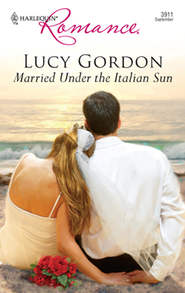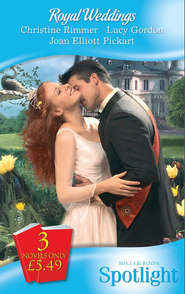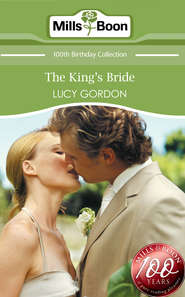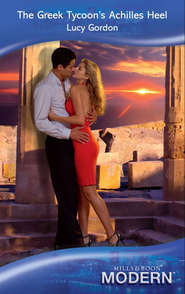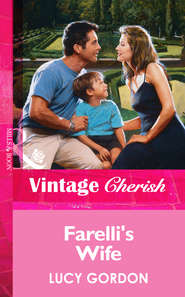По всем вопросам обращайтесь на: info@litportal.ru
(©) 2003-2024.
✖
Christmas in Venice
Автор
Год написания книги
2019
Настройки чтения
Размер шрифта
Высота строк
Поля
In any other city they would have gone by car, but there were no cars in this place where the streets were water, so when they left the hotel they strolled across the piazza before plunging into a maze of tiny alleys.
Sonia pulled her coat about her, shivering. A heavy mist had appeared and in the darkness of the narrow lanes it was hard to see far ahead. All she could make out clearly were the coloured lamps that had been hung up for Christmas, and the lights glowing from the windows of homes. People scurried up and down, carrying parcels, wearing smiles. It was Christmas, and despite the gloomy weather the Venetians were set on celebrating.
A turn brought them out beside a narrow canal, the water’s surface pitted by raindrops. Here there were no lights, no people, just a dank chill.
Suddenly she became aware of their direction. ‘Not this way,’ she said sharply.
‘This is the quickest route to the hospital.’
As he spoke they turned another corner and there was the place she hadn’t wanted to see, the Ristorante Giminola, looking just the same as when she’d seen it for the first time. Francesco saw her face.
‘So you’re not as hard-hearted as you would like me to believe,’ he said.
If only he knew, she thought, how far from hard-hearted she was. She should never have come back. It hurt too much. She drew a sharp breath. No weakening. She managed to shrug.
‘As you say, it’s the quickest route to the hospital. Let’s go.’
But she walked past the restaurant without looking at it. She didn’t want to remember the night when he’d taken her to it for the first time, and they’d fallen in love. That had been two and a half years ago, in another world, where the sun had shone and everything had been possible.
The simple white dress was as perfect on her as he had predicted. She tried on three sets of accessories before settling for a necklace of turquoises mounted in silver.
Then more decisions. Her hair. It was light brown and grew in wavy profusion halfway down her back. Up or down? Of course, he’d already seen it down, that afternoon. Not that he’d been looking at her hair, she recalled with a smile. Up, then.
She studied her face closely, wanting him to see it at its best. She’d been a professional woman ever since she’d first braved the world alone three days after her sixteenth birthday, with no family to help or hinder. She was used to applying make-up to emphasise the assets nature had given her, the lovely skin, regular features and large blue, expressive eyes. But, studying herself in this way, she missed the signs that warned of trouble ahead. Her mouth was curved and lovely, but a touch too resolute, the mouth of a woman who’d had to fight too much, too hard, too young. If she was unlucky it might become stubborn and unyielding, driving away the very thing for which she most yearned.
But right now the warnings were faint. She was in a city she’d dreamed of visiting, full of happy excitement, and her mouth was ready for laughter and—she considered thoughtfully—and whatever else the evening might bring.
At five minutes to the hour there was a knock on her door. Opening it, she found nobody there, just one perfect red rose, lying at her feet. She managed to fix it in her hair, just before the second knock.
This time it was him, and his eyes went straight to the rose.
‘Thank you,’ he said simply.
She didn’t ask where they were going. What did it matter? When they were downstairs he took her hand and led her out into the sunlight, and it was as though she’d never known sunlight in her life before. Across the piazza and into an alley so tiny that the sun was blotted out, around corners, down more alleys, each one looking just like the last.
‘How do you ever remember your way?’ she asked in wonder.
‘I’ve known the calles all my life.’
‘Calles?’ She savoured the word.
‘You would call them “alleys”, the tiny streets where we can walk and talk to our neighbours.’
Something in his voice made her ask, ‘And you love them, don’t you?’
‘Every brick and stone.’
When they burst out of the last calle she had to stand and blink at the flashing of the sunshine on the Grand Canal. Francesco grasped her hand more firmly and drew her to some sheltered tables beside the water. While he ordered coffee she gazed out on the bustle of the canal. Every boat in Venice seemed to be there, and arching over them a wide bridge, with buildings on both sides.
‘That’s the Rialto Bridge,’ Francesco told her. ‘Do you remember your Shakespeare? Shylock in The Merchant of Venice?’
‘He asked, “What news on the Rialto?’” Sonia recalled.
‘Because in those days it was a great commercial centre, where all the money deals were done. Now it’s mostly trinket shops and a food market.’
‘All those boats!’ she exclaimed. ‘Gondolas, motor boats, all crowded together. You’d think they’d bump into each other. What’s that long boat with a white roof?’
‘That a vaporetto, a kind of bus. It plies the Grand Canal.’
He fell silent while she watched, entranced by the life and the vivid colours. There was so much she wanted to ask about, but not yet. For now it was enough to be here, entranced by the beauty and magic of her surroundings, feeling another, older kind of magic creep over her. She gave him a brief, sidelong glance, but she didn’t need to do that to know he was watching her, smiling with delight.
‘If you’ve finished your coffee, we might walk on,’ he said at last. As they got to their feet he took her hand again, and led her over the Rialto Bridge.
As he’d said, there was a lively market, just beginning to wind down. He stopped at a stall, took two peaches and handed her one. The plump grocer watched him with a grin, which didn’t fade even when Francesco said,
‘Your peaches don’t get any better. But I’ll do you a favour and relieve you of a couple.’ He strode on.
‘Hey,’ Sonia said, hurrying to catch up with him, ‘shouldn’t you have paid for those?’
‘Pay?’ he was shocked. ‘Pay my own cousin?’
‘That man was your cousin?’
‘That’s Giovanni. Every time his wife gets mad at him he comes to me and I give him a beautiful piece of glass for nothing, to placate her.’
‘Does she get mad often?’
He considered. ‘He’s a good husband—in his way, but he has an eye for the ladies. I’m running out of glass and I haven’t paid for my fruit for years.’
She chuckled. This was all mad, but it was like being on another planet, where the rules were different, and she could have a holiday from being her usual tense, cautious self.
Afterwards there were so many things to remember about that first night, but sometimes they all seemed to blur together, and sometimes each detail stood out sharply. All Venice seemed to be the same little street, one turning into another. Yet the Ristorante Giminola where he’d taken her to eat was clear in her mind.
It was a small cosy place where the owner greeted Francesco with a yell and showed them to a table by the window. The menu delighted Sonia. It was printed in three languages and the translations had been done by someone whose English was hit and miss.
‘What on earth are “schambed eggs”?’ she laughed.
‘I think they’re “scrambled eggs”, but I wouldn’t bet on it.’
‘And “greem beans”?’
‘Done by the same man, I should think. Also “roats potatoes”.’
He ordered wine and prosciutto ham.
‘Tell me about yourself,’ he said. ‘I want to know everything about you.’
An imp of mischief made her reply, ‘I think you’ve already seen everything about me.’






